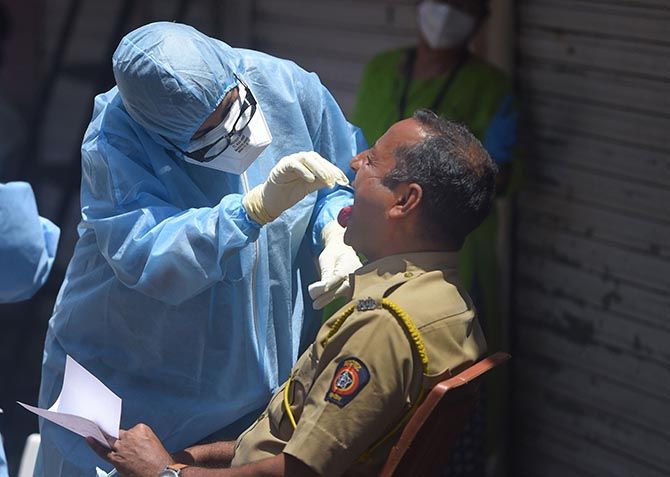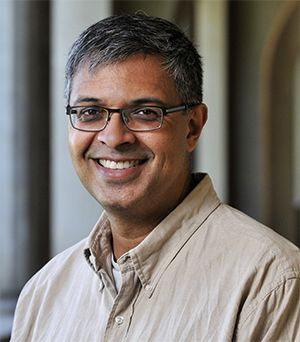'Scientists around the world are focused on very quickly doing work to help us better understand what we are facing.'
'I am inspired by what scientists have found in such a short amount of time since the virus emerged.'

"It is irresponsible to make promises about timelines to a COVID-19 cure, but irresistible to speculate about them. So in the spirit of speculation rather than a promise, I believe that we will have much improved knowledge about effective therapeutics for COVID-19 infection within months, rather than years," says Dr Jayanta Bhattacharya, professor of medicine at Stanford University.
Dr Bhattacharya, a doctor, medical researcher and economist, has argued that the fatality rate projected by WHO may be too high.
'That estimate is deeply flawed. The true fatality rate is the portion of those infected who die, not the deaths from identified positive cases. The latter rate is misleading because of selection bias in testing,' Dr Bhattacharya, below, wrote in a much discussed column in The Wall Street Journal last week.
In recent days, Dr Bhattacharya has been involved in a project to find out how many people may actually have the virus without any symptoms.
"Our current understanding of the spread of disease comes from the number of patients identified with active viral infection. This misses the set of people who had the infection -- including mild forms of the disease -- but were never tested or identified," Dr Bhattacharya tells Rediff.com's Archana Masih in an e-mail interview.
You have argued that the fatality rate projected by WHO of 2% to 4% may be too high. Could you explain to our readers the reason behind this view?
My basic argument is that the case fatality numbers reported by the WHO and other organisations have the denominator wrong.
Those calculations rely on a guess about how many cases of COVID-19 there are in the population per identified case, but this guess is not based on any reliable scientific studies.
My review of the available evidence suggests to me that the WHO's estimate of the number of COVID-19 is cases much too low, and their estimate of the infection fatality rate much too high.
We will know the answer very soon once we have final numbers from the population antibody seroprevalence studies.
Dr Ramanan Laxminarayan, director of the Centre for Disease, Dynamics, Economics and Policy, warned in an interview mid-March that India would be dealing with a 'tsunami of infections' if the same mathematical models of the US and UK were applied to India.
There are 5,360 COVID-19 cases in India and 164 deaths so far (April 8, 2020).
India's count is roughly double of what it was four days ago and it is being said that this is a make or break week for India.
In your assessment, what kind of a trajectory is India on?
It is impossible to tell from the case reports alone how far along India is in the COVID-19 epidemic trajectory.
India needs population seroprevalence studies done immediately so that we can have a reliable answer to that question to guide policy.
Without such studies, all decisions are being made in the dark.
India is in the 17th day of a 21-day national lockdown and many state chief ministers have conveyed to the federal government the need to extend it further.
Without downplaying the COVID-19 crisis, is such a long lockdown counterproductive in the long term?
The lockdown of the sort implemented in India and around the world are certainly effective is slowing the spread of COVID-19 in the population.
At the same time, these lockdowns will have long lasting health and mortality costs that are less immediately visible than patients dying from COVID-19 infections, but no less real.
For India, I worry for the poor who cannot afford much time away from their work and livelihood without facing very severe deprivation.
The lockdown will have a catastrophic effect on the wealth of the world, and we know for a fact that a poorer world will be a home to less healthy, less long-lived people.
The cure in this case may be worse than the disease.
Could you briefly tell me about the antibody test that you and your colleagues have been busy with? How will this help in our understanding of the virus and its cure?
The goal of our work is to understand how widespread COVID-19 infection is in the population. To this end, my group is working on surveillance of specific anti-COVID-19 antibody prevalence in broad populations.
Our current understanding of the spread of disease comes from the number of patients identified with active viral infection.
This misses the set of people who had the infection -- including mild forms of the disease -- but were never tested or identified. (This is distinct from work to develop a test that can detect specific anti-COVID-19 antibodies).
This work is important because without accurately measuring the set of people who have been infected, we cannot know infection fatality rate nor how far along we are in the epidemic -- that is how close we are to the end of the epidemic.
What have been the some of the findings of these tests? Do they bear any encouraging news for a world anxious and fearful of the coronavirus?
This past week, we collected blood samples from about 3,000 people representative of the population of Santa Clara county, California, in the United States.
We are analysing these samples and soon we will know how many people have actually have had the infection, and what the risk of death from contracting COVID-19 actually is.
Our hypothesis is that there are many people who have had the infection per person identified, and hence the infection fatality rate is lower than the initial reports.
We are making plans to expand these sorts of population prevalence surveillance studies throughout the US as rapidly as we can. We will see soon if our hypothesis is correct.
Is there a silent COVID-19 infected population especially in a country like India where there is low testing?
Is there a possibility of large swathes of people, especially among the poor, being infected, not knowing that they have the virus and recovering from it?
Yes, this seems very likely to be true. India (and the rest of the world) should conduct population seroprevalence studies immediately.

Scientists and researchers around the world have been hard at work in the past few months battling COVID-19. What is the mood in the scientific world about this?
Scientists around the world are focused on very quickly doing work to help us better understand what we are facing.
I am inspired by what scientists have found in such a short amount of time since the virus emerged.
I am certain that there will be significant discoveries to come.
The scientific community is motivated to make these discoveries, including advances in treatment and safe vaccines to prevent COVID-19, as rapidly as possible.
What are the prominent countries and labs where work is going on to counter this virus?
I think this work is happening around the world. The scientific response has truly been global.
The discovery that solves the COVID-19 problem for the world could come from anywhere, and I am not in a position to speculate about exactly where the key ideas will arise.
Which brings me to the most vital question: How far do you think we are from finding a cure?
It is irresponsible to make promises about timelines to a cure, but irresistible to speculate about them.
So in the spirit of speculation rather than a promise, I believe that we will have much improved knowledge about effective therapeutics for COVID-19 infection within months, rather than years.
But my friends always accuse me of being overly optimistic, so please take that speculation for what it is worth.










